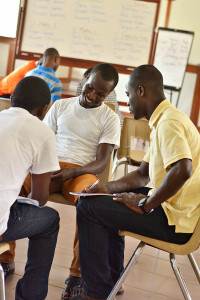April 27-29, 2015
What do you get when you combine several young American volunteers, 17 Ghanaian teachers, countless experiential learning activities, and 3 full days? You get the first Experiential Educators Workshop!

Held in Koforidua, Ghana from April 27 to 29, this workshop, as the first of its kind in AgriCorps history, brought together 17 teacher (and emerging teacher) participants from 9 different schools in the Eastern and Volta regions of Ghana. The event was made possible through funds from the Penn State Global Teach Ag program, the Penn State Teach Ag! Society, Penn State Collegiate FFA, and Dr. Gary Briers of Texas A&M University. Coordinated by current AgriCorps Members (ACMs) Allison Hoover and John Romo, the 3-day event hosted 7 unique workshop sessions that spanned topics such as effective classroom management, engaging classroom activities, and problem based learning. The sessions were presented by the Ghana ACMs as well as a local cooperating teacher. The event closed with the participants teaching a “mini-lesson” that was to incorporate experiential methods they had learned.

The AgriCorps model embodies the ideals of experiential, student-centered learning in order to develop critical thinking skills and leadership potential in students of its targeted developing nations. After living and working with the Ghana education system for over 7 months, the Ghana ACMs were able to identify some areas of strength as well as weakness in their fellow teachers’ classrooms – thus leading to the agenda of this experiential education training. Participants not only appreciated the ideas that were brought by the experience of the ACMs, but they freely added their own experiences and perspectives to the contents of the workshop, which created a synergetic, fruitful discussion that continued throughout the event.
One of the most noted testimonies to the experiential learning model was a “learning experiment” that was conducted with the participants. On the first day, the teachers were split into 3 groups and taught the same concepts (how to make compost) but with three different teaching styles: lecture, demonstration, and experiential. The next morning, they took a quiz on the compost concepts and saw, quantitatively, the positive effects of hands-on learning methods. The “lecture” group scored an average of 78% on their quiz while the “demonstration” group scored 85% and the “experiential” group scored 98%! These results led to a productive reflection of the three teaching types and how each could be improved to increase student-centered learning.

Another impactful story from the training was the participation of three students from Melissa Tabke’s placement – SDA Teacher Training College. These workshop participants, though not yet official teachers, were able to engage in group discussions and glean perspectives and advice from teachers who have been in the profession for several years. All of these college students acted as the “teacher” for small group’s mini-lesson on Wednesday – creating a perfect example of “learning (to be a teacher) by doing.” One student in particular stood out not only as the best teacher among his student peers, but probably the best teacher of all workshop participants. His passion for teaching was partnered by his ability to quickly understand and apply experiential learning concepts into his group’s 15 minute mathematics lesson.
The training was an overall success, as the participants were actively engaged in all aspects of the 3-day workshop. The AgriCorps members also witnessed some “sparks” going off in the minds of these teacher participants as they realized how and why experiential, student-centered techniques are so beneficial. Given this success, AgriCorps hopes to continue these trainings in the coming years, as we firmly believe in developing the students’ potential to become creative and prosperous leaders of their communities and their country as a whole.




